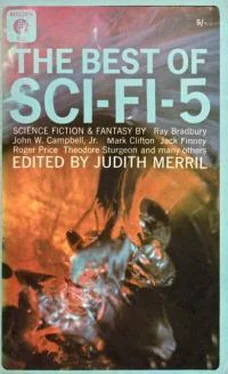The Best of Sci-Fi-5
Здесь есть возможность читать онлайн «The Best of Sci-Fi-5» весь текст электронной книги совершенно бесплатно (целиком полную версию без сокращений). В некоторых случаях можно слушать аудио, скачать через торрент в формате fb2 и присутствует краткое содержание. Год выпуска: 1966, Издательство: Mayflower-Dell, Жанр: Фантастика и фэнтези, на английском языке. Описание произведения, (предисловие) а так же отзывы посетителей доступны на портале библиотеки ЛибКат.
- Название:The Best of Sci-Fi-5
- Автор:
- Издательство:Mayflower-Dell
- Жанр:
- Год:1966
- ISBN:нет данных
- Рейтинг книги:3 / 5. Голосов: 1
-
Избранное:Добавить в избранное
- Отзывы:
-
Ваша оценка:
- 60
- 1
- 2
- 3
- 4
- 5
The Best of Sci-Fi-5: краткое содержание, описание и аннотация
Предлагаем к чтению аннотацию, описание, краткое содержание или предисловие (зависит от того, что написал сам автор книги «The Best of Sci-Fi-5»). Если вы не нашли необходимую информацию о книге — напишите в комментариях, мы постараемся отыскать её.
The Best of Sci-Fi-5 — читать онлайн бесплатно полную книгу (весь текст) целиком
Ниже представлен текст книги, разбитый по страницам. Система сохранения места последней прочитанной страницы, позволяет с удобством читать онлайн бесплатно книгу «The Best of Sci-Fi-5», без необходимости каждый раз заново искать на чём Вы остановились. Поставьте закладку, и сможете в любой момент перейти на страницу, на которой закончили чтение.
Интервал:
Закладка:
The stage had been stripped. The music stands had been kicked over, the stove lay on its side with two or three old pans around it, underfoot there was a miscellaneous litter of paper, ash and empty vials.
Mangon searched around for the message, probably pinned to one of the partitions.
Then he heard it screaming at him from the walls, violent and concise.
“GO AWAY YOU UGLY CHILD! NEVER TRY TO SEE ME AGAIN!”
He shrank back, involuntarily tried to shout as the walls seemed to fall in on him, but his throat had frozen.
As he entered the corridor below the stage shortly before eight-twenty, Mangon could hear the sounds of the audience arriving and making their way to their seats. The studio was almost full, a hubbub of well-heeled chatter. Lights flashed on and off in the corridor, and oblique atmospheric shifts cut through the air as the players on the stage tuned their instruments.
Mangon slid past the technicians manning the neurophonic rigs which supplied the orchestra, trying to make the enormous triple-bass case as inconspicuous as possible. They were all busy checking the relays and circuits, and he reached the cue-box and slipped through the door unnoticed.
The box was almost in darkness, a few rays of colored light filtering through the pink and white petals of the chrysanthemums stacked over the hood. He bolted the door, then opened the case, lifted out the sonovac and clipped the snout into the cannister. Leaning forward, with his hands he pushed a small aperture among the flowers.
Directly in front of him he could see a velvet-lined platform, equipped with a white metal rail to the center of which a large floral ribbon had been tied. Beyond was the orchestra, disposed in a semicircle, each of the twenty members sitting at a small boxlike desk on which rested his instrument, tone generator and cathode tube. They were all present, and the light reflected from the ray screens threw a vivid phosphorescent glow onto the silver wall behind them.
Mangon propped the nozzle of the sonovac into the aperture, bent down, plugged in the lead and switched on.
Just before eight twenty-five someone stepped across the platform and paused in front of the cue-hood. Mangon crouched back, watching the patent leather shoes and black trousers move near the nozzle.
“Mangon!” he heard Alto snap. He craned forward, saw Alto eyeing him. Mangon waved to him and Alto nodded slowly, at the same time smiling to someone in the audience, then turned on his heel and took his place in the orchestra.
At eight-thirty a sequence of red and green lights signaled the start of the program. The audience quietened, waiting while an announcer in an offstage booth introduced the program.
A compere appeared on stage, standing behind the cue-hood, and addressed the audience. Mangon sat quietly on the small wooden seat fastened to the wall, staring blankly at the cannister of the sonovac. There was a round of applause, and a steady green light shone downward through the flowers. The air in the cue-box began to sweeten, a cool motionless breeze eddied vertically around him as a rhythmic ultrasonic pressure wave pulsed past. It relaxed the confined dimensions of the box, and had a strange mesmeric tug that held his attention. Somewhere in his mind he realized that the symphony had started, but he was too distracted to pull himself together and listen to it consciously.
Suddenly, through the gap between the flowers and the sonovac nozzle, he saw a large white mass shifting about on the platform. He slipped off the seat and peered up.
Madame Gioconda had taken her place on the platform. Seen from below she seemed enormous, a towering cataract of glistening white satin that swept down to her feet. Her arms were folded loosely in front of her, fingers flashing with blue and white stones. He could only just glimpse her face, the terrifying witchlike mask turned in profile as she waited for some offstage signal.
Mangon mobilized himself, slid his hand down to the trigger of the sonovac. He waited, feeling the steady subliminal music of Alto’s symphony swell massively within him, its tempo accelerating. Presumably Madame Gioconda’s arranger was waiting for a climax at which to introduce her first aria.
Abruptly Madame Gioconda looked forward at the audience and took a short step to the rail. Her hands parted and opened palms upward, her head moved back, her bare shoulders swelled.
The wave front pulsing through the cue-box stopped, then soared off into a continuous unbroken crescendo. At the same time Madame Gioconda thrust her head out, her throat muscles contracted powerfully.
As the sound burst from her throat Mangon’s finger locked rigidly against the trigger guard. An instant later, before he could think, a shattering blast of sound ripped through his ears, followed by a slightly higher note that appeared to strike a hidden ridge halfway along its path, wavered slightly, then recovered and sped on, like an express train crossing lines.
Mangon listened to her numbly, hands gripping the barrell of the sonovac. The voice exploded in his brain, flooding every nexus of cells with its violence. It was grotesque, an insane parody of a classical soprano. Harmony, purity, cadence had gone. Rough and cracked, it jerked sharply from one high note to a lower, its breath intervals uncontrolled, sudden precipices of gasping silence which plunged through the volcanic torrent, dividing it into a loosely connected sequence of bravura passages.
He barely recognized what she was singing: the Toreador song from Carmen . Why she had picked this he could not imagine. Unable to reach its higher notes she fell back on the swinging rhythm of the refrain, hammering out the rolling phrases with tosses of her head. After a dozen bars her pace slackened, she slipped into an extempore humming, then broke out of this into a final climactic assault.
Appalled, Mangon watched as two or three members of the orchestra stood up and disappeared into the wings. The others had stopped playing, were switching off their instruments and conferring with each other. The audience was obviously restive; Mangon could hear individual voices in the intervals when Madame Gioconda refilled her lungs.
Behind him someone hammered on the door. Startled, Mangon nearly tripped across the sonovac. Then he bent down and wrenched the plug out of its socket. Snapping open the two catches beneath the chassis of the sonovac, he pulled off the cannister to reveal the valves, amplifier and generator. He slipped his fingers carefully through the leads and coils, seized them as firmly as he could and ripped them out with a single motion. Tearing his nails, he stripped the printed circuit off the bottom of the chassis and crushed it between his hands.
Satisfied, he dropped the sonovac to the floor, listened for a moment to the caterwauling above, which was now being drowned by the mounting vocal opposition of the audience, then unlatched the door.
Paul Merrill, his bow tie askew, burst in. He gaped blankly at Mangon, at the blood dripping from his fingers and the smashed sonovac on the floor.
He seized Mangon by the shoulders, shook him roughly.
“Mangon, are you crazy? What are you trying to do?”
Mangon attempted to say something, but his voice had died. He pulled himself away from Merrill, pushed past into the corridor.
Merrill shouted after him. “Mangon, help me fix this! Where are you going?” He got down on his knees, started trying to piece the sonovac together.
From the wings Mangon briefly watched the scene on the stage.
Madame Gioconda was still singing, her voice completely inaudible in the uproar from the auditorium. Half the audience were on their feet, shouting toward the stage and apparently remonstrating with the studio officials. All but a few members of the orchestra had left their instruments, these sitting on their desks and watching Madame Gioconda in amazement.
Читать дальшеИнтервал:
Закладка:
Похожие книги на «The Best of Sci-Fi-5»
Представляем Вашему вниманию похожие книги на «The Best of Sci-Fi-5» списком для выбора. Мы отобрали схожую по названию и смыслу литературу в надежде предоставить читателям больше вариантов отыскать новые, интересные, ещё непрочитанные произведения.
Обсуждение, отзывы о книге «The Best of Sci-Fi-5» и просто собственные мнения читателей. Оставьте ваши комментарии, напишите, что Вы думаете о произведении, его смысле или главных героях. Укажите что конкретно понравилось, а что нет, и почему Вы так считаете.












